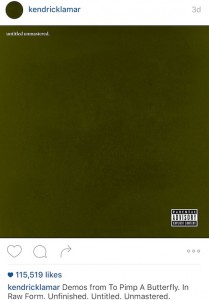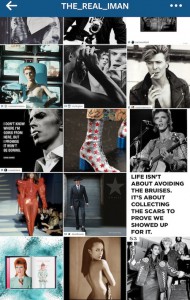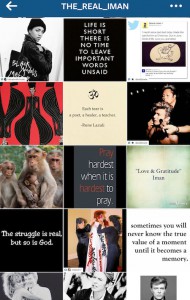Andy Edwards explores what having a Pulitzer Prize winning rapper means for the music industry and the arts landscape as a whole. This article first appeared in Record of the Day.
DAMN. Kendrick Lamar is the first non-classical or jazz artist to win the Pulitzer Prize for Music. The Pulitzer Prize was launched in 1917 and the first Pulitzer Prize for Music was awarded in 1943. Kendrick Lamar is the 67th recipient.
The Pulitzer is a name with overwhelming gravitas, commonly associated with American journalism, poetry and literature. The music category recognizes “distinguished musical composition by an American that has had its first performance or recording in the United States during the year.”
The award itself comes with little fanfare, no red carpet sizzle, but, rather, the recipient will forever be known as the “Pulitzer Prize winning author/journalist/ poet/ composer/ etc”. The attention heaped upon Pulitzer Prize winning rapper and songwriter Kendrick Lamar has been truly global. His award made headline news here in the UK, prompting widespread comment. The significance of this moment cannot be understated and had many layers relevant to all of us in the music industry and in a number of ways.
The significance for hip-hop and black music
As Jasmine Dotiwala pointed out on Sky News, in the early ‘90s the US government tried to shut down the likes of NWA, Ice T and Snoop Doggy Dogg. Twenty-five years later a 30-year-old rapper from Compton is being feted by the establishment, hopefully signaling a new level of acceptance.
It sets a significant marker for the music industry itself. The last black artist to win Album of the Year at the Grammys was Herbie Hancock in 2008. Lauryn Hill and OutKast have won Album of the Year in the past, but in recent years no black artist has won the accolade. At a time when black music has reached new artistic heights and cultural resonance coupled with poor female representation, The Recording Academy has been blasted for being out of touch.
DAMN was actually shortlisted for Best Album at this year’s Grammys, Lamar’s third nomination for the award. Childish Gambino and Jay-Z also made the shortlist but they all lost out to Bruno Mars. Beyoncé has made the shortlist three times, culminating with her greatest work yet, Lemonade, leaving her empty handed again last year prompting many to ask, what has the lady got to do to win Best Album?
In winning the Pulitzer Prize, Lamar has leapfrogged the Grammys in recognition. Perhaps this serves as a challenge to The Recording Academy to go further and do better as it considers options for 2019?
The significance for contemporary music
Bob Dylan, Neil Young and Bruce Springsteen, have all won many plaudits over the years as authentic and significant American artists and storytellers, but none have won a Pulitzer Prize for Music. The overwhelming majority of recipients are classical. In recent years, a handful of jazz artists have won the award, first Wynton Marsalis in 1997, then Ornette Coleman in 2007 and Henry Threadgill in 2016. These gentlemen are masters of their art, but it took them years to reach that level of acceptance by the American arts establishment.
Only last week, the debate surrounding Arts Council funding in the UK contrasting the attitudes afforded to opera and classical at the expense of other genres, illustrates how far contemporary music still has to go in winning over the arts establishment in the UK. Kendrick Lamar’s achievement is significant not only for hip-hop, or for black music, but for contemporary music as a whole. It challenges the arts establishment around the world to fully embrace the cultural significance of contemporary music.
Arts Council England could learn a great deal from the Pulitzer’s and the process behind them. Kendrick Lamar’s award was the result of not only diverse and inclusive voices, but also diverse and inclusive process, thought and debate.
As David Hajdu, one of the jurors and also a writer for The Nation, explained in the New York Times, “some pieces of classical music that drew upon hip-hop as a resource, that led us to put on the table the fact that this sphere of work – rap music – has value on its own terms and not just as a resource for use in a field that is more broadly recognized by the institutional establishment as serious or legitimate.”
The tone and conduct of the debate brought together jurors from a range of artistic backgrounds, including those more traditional, to this unanimous outcome.
Be unashamedly artistic
In the streaming age, play counts are the new heavy rotation. Play counts have become an obsession. The challenge of introducing new artists to the market and making an impact is one the industry continues to grapple with. Once that artist finds an audience and begins to grow, however, the only limitations are the artist’s own ambition and hard work.
As the man himself, explained: “you have to listen to it over and over and over again to fully understand the direction and the message that I put in there; the execution of it. And I want you to do that. I wanna challenge the way you think and the way you take your music.”
We could be clever and conclude that Kendrick Lamar is taking a counter intuitive approach to music making in the streaming age, but really he is just being a true artist: thought provoking and provocative. He is putting out his music on his terms and he wants you to listen to it on his terms. Streaming included.
This Pulitzer success, coupled with DAMN’s commercial success signals very clearly that the album, as a format and a concept, is not going away. Moreover, whenever anyone says “could {insert classic album} be made today?” Stylistics aside, the answer is a resounding yes.
#BLACKLIVESMATTER
What this award also recognizes is a journalistic quality to Kendrick Lamar’s work that documents contemporary African American life. YouTube and social media have exposed long-held injustices affecting the black community to broader white audiences and almost every form of artistic expression has harnessed this moment.
Black creators are succeeding in every creative field around the world, be it movies such as Get Out and Black Panther, television comedies such as Issa Rae’s Insecure and Michaela Coel’s Chewing Gum in the UK. In non-fiction, Reni Eddo-Lodge has produced a global best seller that began with a frustration at that typically (white) British trait of brushing uncomfortable truths (race) under the carpet. Pulling it all together is a renewed focus on Africa not only as a source of inspiration, but also a source of creative talent. This dynamic has not gone unnoticed by Midem organisers who will be exploring African markets such as Nigeria, Ivory Coast and the Congo in Cannes this year.
A political thread connects all of these creators and across all continents, albeit from many different viewpoints and experiences. It also serves as a reminder to all recording artists and the industry that supports them, that in challenging times a political message has artistic resonance with a mainstream audience.
There is a generation of executives too young to remember the civil rights movement and Vietnam War that produced such a rich body of music in the late ‘60s and early ‘70s. Instead, that generation was brought up to think of politics in music as being aligned to “Red Wedge” or “New Labour” or some form of party political affiliation. Understandably, this resulted in cynicism and disengagement, whereas millennial artists and audiences display idealism reminiscent of their grandparent’s generation.
The politics of 2018 cuts across party boundaries and country borders. Even in this past week, the Windrush debacle in the UK has prompted a global outcry and it was revealed that Grenfell was entirely preventable. Politics fuelled Stormzy’s electrifying BRITS performance. Politics has taken Beyoncé to new creative heights. Politics is not something for artists to be wary of, nor their managers nor their A&Rs for that matter.
A political narrative can fuel any artist from any background and any genre of music. As a former artist and current music executive said to me only last week, “grime and hip-hop are cutting through because those artists have something to say, other genres have to look to themselves and do better,” (he was once in a guitar band).
Kendrick Lamar has raised the bar not just for hip-hop but all contemporary music. Pulitzer Prize winner. DAMN.
Tweet Andy Edwards your thoughts to @andyedwardsbiz





